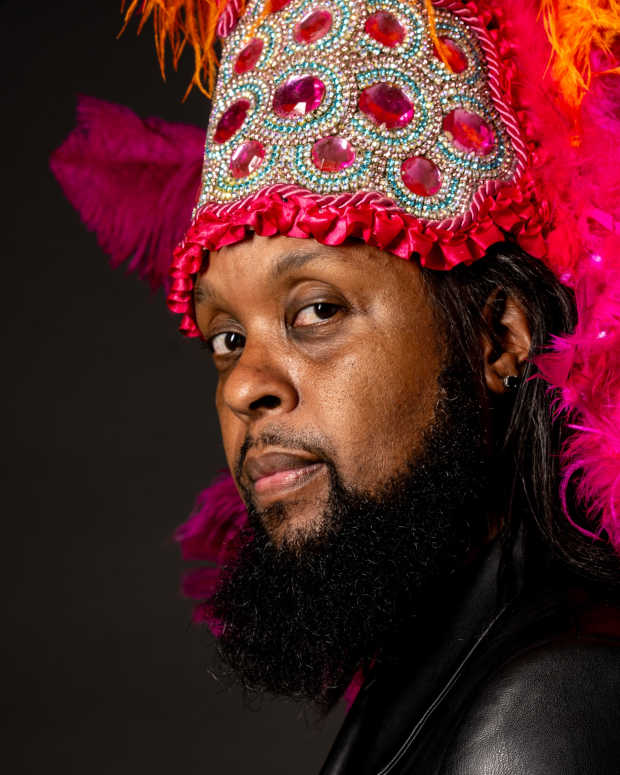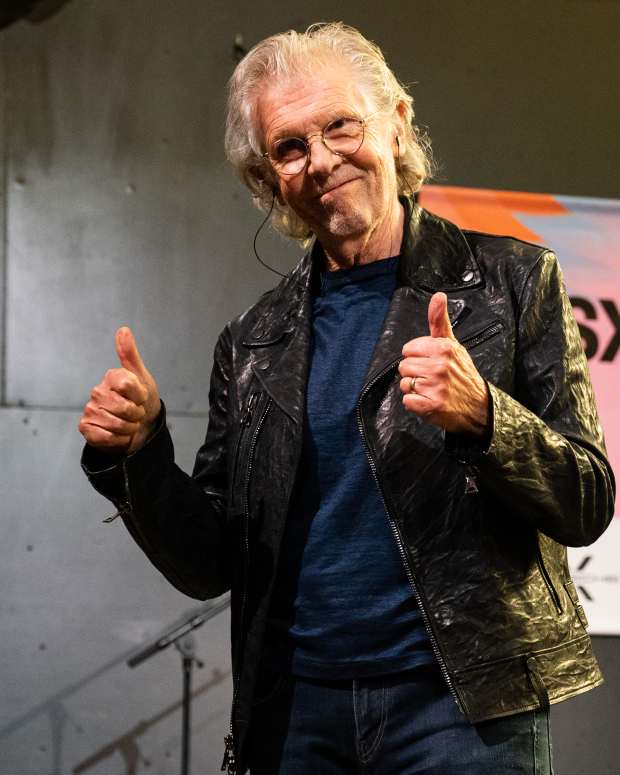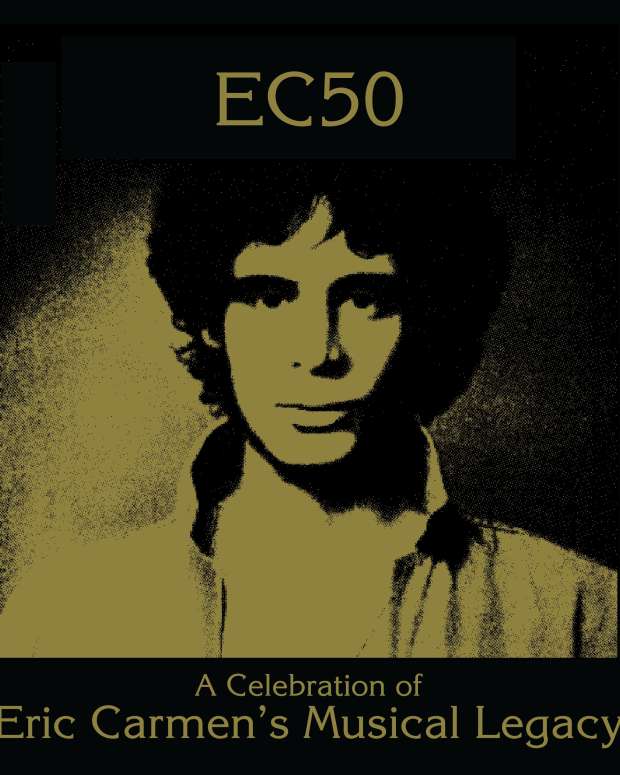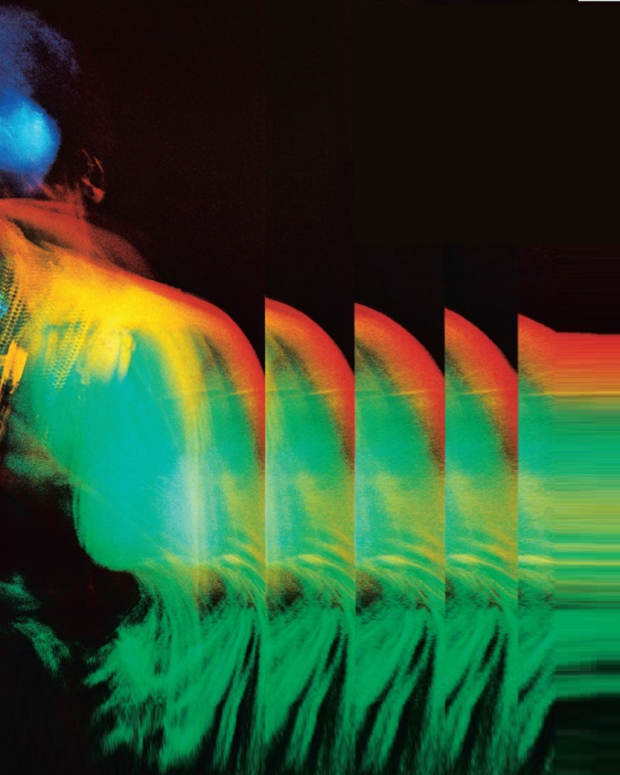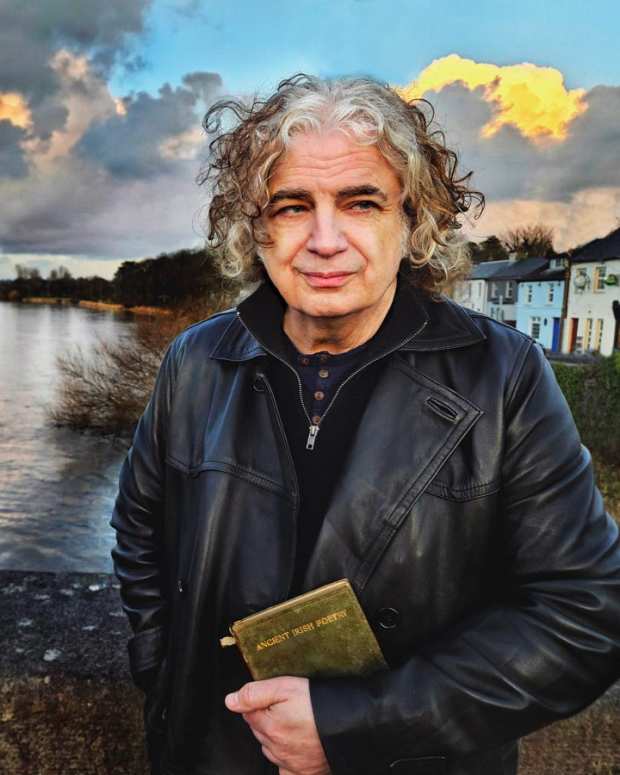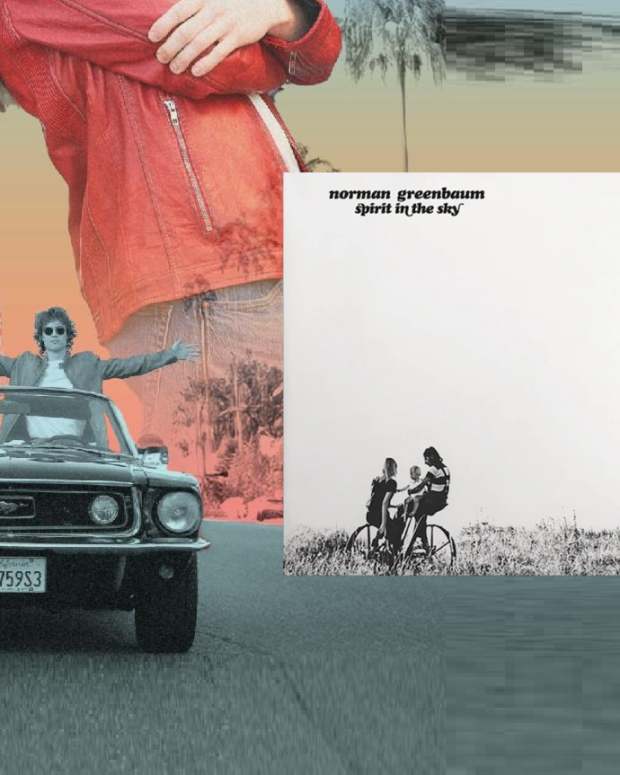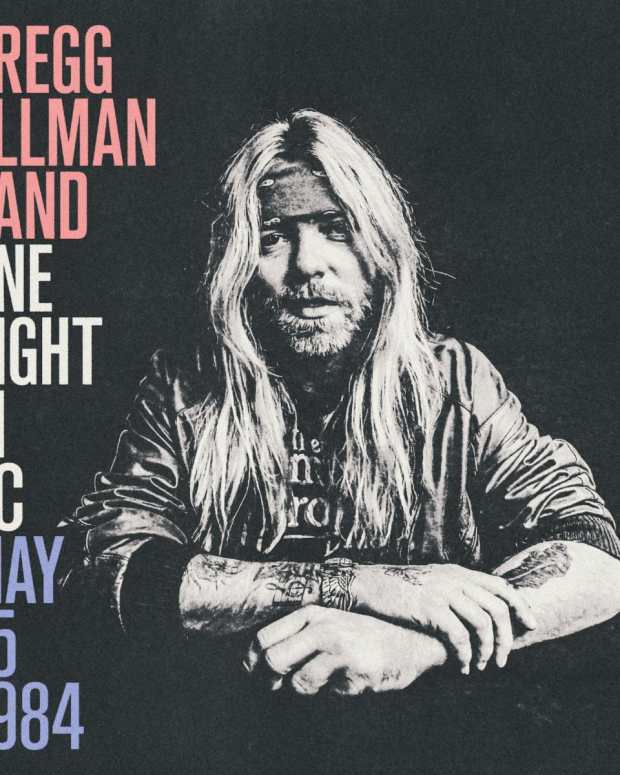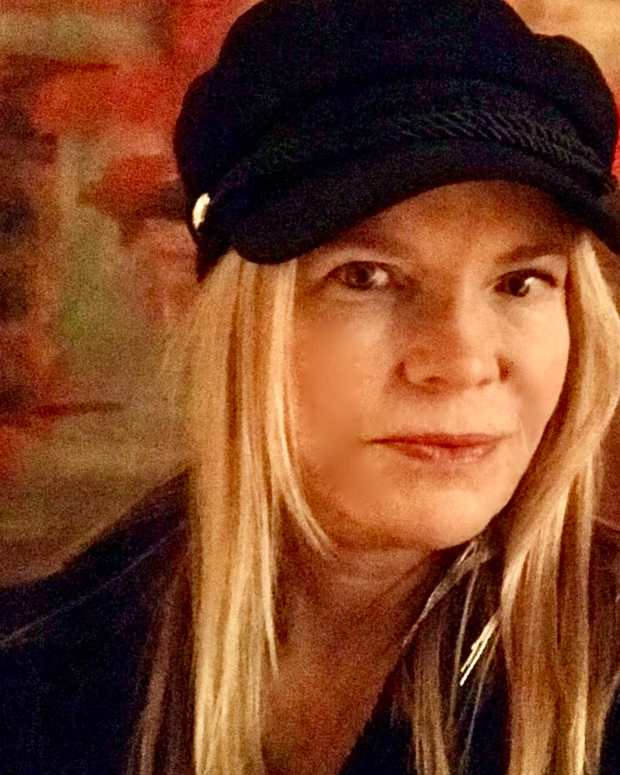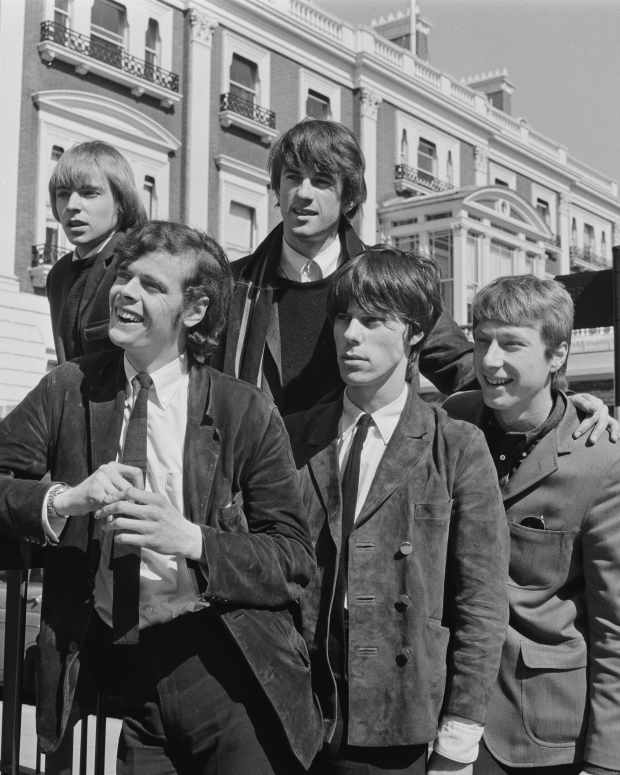Fabulous Flip Sides of Coney Hatch and The Pumps
With the Canadian border now reopened, this week and next week we head north to celebrate new releases from our continental neighbor.
PART ONE – CONEY HATCH’S ANDY CURRAN
GOLDMINE: Congratulations on your double live album Live At The El Mocambo from your Toronto concert in October 2020.
ANDY CURRAN: Thank you. The opportunity came up through Michael Wekerle, the owner of The El Mocambo, who is such a big Coney Hatch fan.
GM: The first time I heard of The El Mocambo was in 1977 with April Wine’s album Live at The El Mocambo which included “She’s No Angel” as the single from the album. I heard that song on Canadian radio, long distance from Cleveland. April Wine opened for The Rolling Stones at that venue, with side three of The Rolling Stones double album Love You Live recorded from the The El Mocambo shows, ending with their fun version of Chuck Berry’s “Around and Around.” Did you attend shows there when you were growing up?
AC: Oh my God yes. That’s a great question, because I always consider myself a music fan first, then a musician. Growing up as a kid in Toronto, keeping an eye on the club scene, you always knew that The El Mocambo had great acts from The Ramones, to Cheap Trick, to Stevie Ray Vaughan, and U2 even played their first Canadian show there. I was there when The Cars made their Canadian debut after they released their first album in 1978. I saw Rory Gallagher and Edgar Winter there, too. When Bon Jovi played their first Toronto show, our band was invited because we were labelmates through PolyGram Records and were encouraged to check out this new band named Bon Jovi. At the time CHUM-FM would do a simulcast. If you turned your radio on and turned on your television to Citytv and turned down the volume, you could both hear and watch the shows, with Streetheart, Goddo, Bryan Adams and other Canadian acts. It is kind of Canada’s version of CBGB.
GM: On CHUM-AM “Hey Operator” was on their chart for a couple of months in late 1982.
AC: Yes, we had a good run of success on rock radio. That was also the era of MTV and Much Music in Canada, where they were literally soliciting acts for videos. Our first album ended up going gold in Canada. You mentioned Cleveland. I remember driving down there to play the Coffeebreak Concert at The Agora to be broadcast on WMMS. I had never played a show so early in my life. We were on the stage around 11 a.m.
GM: I remember the series. The Agora to us was like The El Mocambo to you. Buddy Maver booked so many iconic acts there.
AC: We got lucky with early radio play and that helped us out. We played The El Mocambo in 1983, so this 2020 show was a very nice homecoming for us. Playing there I thought, oh my God, I am on the same stage that The Rolling Stones played on. This is awesome!
GM: In 1982, when your debut album was hot in Canada, the flip side of “Hey Operator” was “Stand Up” about free speech to “stand up and say what you want.” I think the song can be applicable today, as an anthem, ironically on Anthem Records.
AC: Ha ha. Maybe even more so today. It is hard to say anything without some group being offended, so it is a very timely track right now. I think both of our countries are built on freedom of speech. I was basically talking in that track and a lot of my friends joke that I was an early rapper, matching words to the groove. Maybe I was an early pioneer of rap rock. I don’t know.
Coney Hatch
Flip side: Stand Up
A side: Hey Operator
Debut: 1982
CHUM peak position No. 19
Anthem ANS-045
GM: The first single I bought on the Anthem label was “Let Go the Line” by the group Max Webster, featuring Kim Mitchell, at Sam the Record Man on Yonge Street in Toronto. How did Kim discover you?
AC: In Toronto, Max Webster used to open up for Rush. I have so many of those concert stubs saved. When Rush recorded their double live album All the World’s a Stage at Massey Hall, the opening act was Max Webster and that’s my earliest recollection of seeing those guys. When we were playing at the rock club called The Gasworks, we would play there from Monday through Saturday. One evening there was a guy at one of the tables and he had a pen and paper. I thought he was doing a review of the band. Between one of our sets, I went down and asked if he worked for one of the local newspapers or a radio station. He said, “No. I am actually writing lyrics,” which I thought was odd as we were pummeling him with decibels of rock and roll. He introduced himself as Pye Dubois, who was pretty much the fifth member of the Max Webster quartet as he wrote all their lyrics. He said that Kim Mitchell had just broken up the Max Webster band and that Kim was looking to sink his teeth into a project, and he had a feeling that Kim would really like our band. He brought Kim to the club a couple of nights later and the rest is Canadian history. It was a lightning strikes moment for us when we had Kim take us under his wing. We borrowed $2500 from my dad and wrote a promissory note to him, which we eventually paid back to him, and recorded a demo. We shopped the demo around to a couple of labels and ended up signing with Anthem Records, with Ray Daniels as our manager, all through the help of Kim Mitchell.
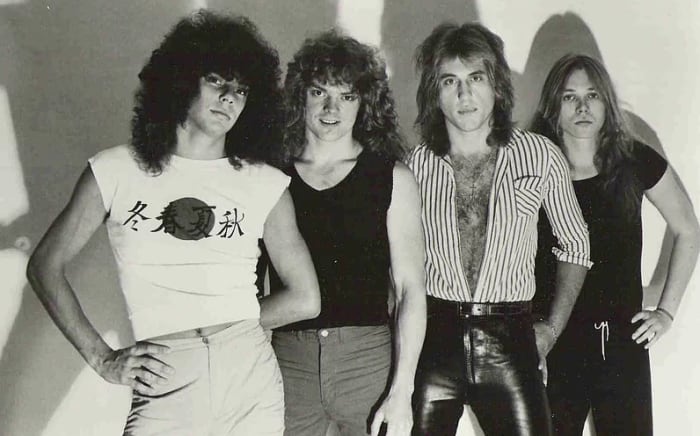
1982 promotional photo, L to R: Andy Curran – bass/vocals, Carl Dixon – lead vocals/guitar, Steve Shelski – lead guitar, Dave Ketchum - drums, coneyhatch.com
GM: You mentioned Rush and WMMS. On the back of Rush’s first album, they thanked WMMS for their support in Cleveland, when Rush had more of a raw trio sound, with “In the Mood” and “Working Man” and John Rutsey on drums. When I listen to “Some Like it Hot” on your live album, you capture that early Rush power that I was introduced to on WMMS.
AC: Thank you for the comparison. It is nice to be mentioned in the same sentence as Rush. I’m guilty of wearing my influences on my sleeve. That guitar driven, blues-based sound certainly draws from Rush, The James Gang and Deep Purple. The title came from one of my favorite Marilyn Monroe films which I actually watched again a couple of days ago, with two musicians dressed in drag, trying to meet her.
GM: In terms of Deep Purple, the album’s opening song “We Got the Night” sounds like something they would open with.
AC: Oh yeah, like that whole “Highway Star” press the gas pedal power. It is a good driving song. We wanted a song that my dad would call the barnburner to set the tone and come out kicking.
GM: From your second album, Outa Hand, “First Time for Everything” is one of my favorite songs of yours and was such a solid single.
AC: Thank you for saying that. We had two lead vocalists. I was one of them along with Carl Dixon who was compared to Paul Rodgers from Bad Company and Free along with Joe Lynn Turner from Rainbow. When “First Time for Everything” came out, it fit within the mold for rock radio. Thanks again to MTV and Much Music we got a lot of solid airplay on it which led to some great touring opportunities to open for Iron Maiden and Judas Priest, which put us on the map in the U.S.
GM: Your next album Friction included the catchy single “She’s Gone.”
AC: I think that’s cut from the same cloth as “First Time for Everything.” That was our last album through PolyGram Records, and it was aptly titled Friction as there was a lot of inner turmoil with the band, but we are still proud of that record.
GM: That same album also included “Wrong Side of Town,” with incredible guitar playing.
AC: “Wrong Side of Town” was inspired by a show in Detroit at a really cool club named Harpos. The manager and staff all warned us not to stray too far from the venue. I took a walk down one of the side roads and was met by a couple of fellows who asked me if I wanted to buy some jewelry. It was a pretty scary moment and I realized I was on the wrong side of town. A lot of Detroit fans knew about our band from hearing our music on Canadian radio. We also had some steady airplay on WRIF in Detroit and had opened for Iron Maiden and Judas Priest previously at Joe Louis Arena in Downtown Detroit, so some fans knew us from those shows, too. It is hard for Ontario bands to get traction in the U.S. We have to bleed in over the airwaves to Detroit and Buffalo.
GM: In the Detroit/Windsor market, the Canadian AM station CKLW was so strong we could hear it clearly in Cleveland. In addition to The Guess Who they also played a lot of April Wine. In listening to April Wine’s “I Like to Rock,” you wait for the end to hear that blending guitar reference with “Day Tripper” and “(I Can’t Get No) Satisfaction.” You took that same approach with my all-time favorite driving song “Radar Love” on your live version of “Fallen Angel.”
AC: I am with you on April Wine. When we recorded “Fallen Angel” for the Outa Hand album our producer Max Norman, who produced the early Ozzy Osbourne solo albums, suggested a sound change to a bit of a shuffle. He asked me if I liked Golden Earring and suggested that we borrowed the groove from them, and our bass and drums are very similar to “Radar Love.” I thought it was a great opportunity to break down the song live and give a little nod to where the seeds for “Fallen Angel” came from. It was my way of paying homage to an act that I grew up with and loved.
GM: It is certainly fun. You mentioned The James Gang earlier. They certainly went through personnel changes. We know them from Cleveland. Jim Fox was the only consistent member. I met him in 1978, when he was promoting the Cleveland band Breathless. They even had a pair of my favorite Canadian musicians in their lineup, Domenic Troiano and Roy Kenner.
AC: Joe Walsh left the group and Domenic came in, and when Dom left to join The Guess Who, I understand that it was Joe Walsh who recommended Tommy Bolin to join the band, who is one of my favorite guitarists. A big treat for me was going to The Beacon Theatre in New York City to see a James Gang reunion with Joe Walsh, Dale Peters and Jim Fox.
GM: “Devil’s Deck” was one of your earliest songs, which opens side four of the live album.
AC: I had originally planned on singing that song, but I felt that it would be a good way to indoctrinate Carl into the band as a new member and was the first song that we had Carl on as a co-writer, who ended up changing some of the lyrics.
GM: The album ends with “No Sleep Tonight,” a great live finale.
AC: “No Sleep Tonight” was a nod to our culture as a band with late night concerts and touring. There were truly nights without sleep, filled with backstage parties in clubs after our shows.
GM: After Coney Hatch ended in the 1980s, you were in Soho 69. We mentioned Bon Jovi before. “Kiss My Boots” sounds like edgy Bon Jovi.
AC: I co-wrote that song with Robin Le Mesurier who was the guitarist in Rod Stewart’s band. I was signed to Sony Music Publishing at that time, and they suggested that I write with him. I grew up listening to Rod Stewart records, so I jumped at the opportunity. That track was inspired by my wife Monica who was a bit of a tomboy. When I first met her, she was riding motorcycles and didn’t wear frilly dresses. She liked sports. I thought she would be an interesting subject matter. I really enjoyed meeting and working with someone of Robin’s stature and I also appreciate working with you on this interview and you taking time out of your day to shine the spotlight on Canadian music from Coney Hatch. Next year look for more music from us, too. We are currently mixing another great live show from Ludwigsburg, Germany and two new studio tracks for a 2022 release. COVID-19 forced us to postpone other shows, but we will surface again in 2022. We’re rock and roll cockroaches and will crawl out from under the floor boards to entertain you!
Coney Hatch link:
PART TWO – THE PUMPS’ CHRIS BURKE-GAFFNEY
GM: Welcome to the Goldmine Canadian 1980s band coverage. Congratulations on Gotta Move finally being released on CD for its 40th anniversary. Let’s discuss the flip sides of the album’s three singles. The first single was “Bust the T.V,” with a touch of a Devo and Cars sound. The bouncy flip side reminds me a bit of “We’re Off You Know” by Canada’s Klaatu, who were compared to The Beatles.
CHRIS BURKE-GAFFNEY: Like most musicians from our era, we were heavily influenced by The Beatles. Even though we were very much a rock and roll band, we wanted to include a lighter, melodic song on the album. You can tell by my bass lines that I am a big Paul McCartney fan.
GM: Yes, I can hear that. The second single was “Success” with Brent Diamond’s keyboards adding a brass-like sound to the recording. Its flip side was “Out of Control,” the album’s opener, with a catchy melody and a sound two years ahead of The Steve Miller Band’s “Abracadabra.” I also like the violin sound Brent added with his keyboard.
CBG: Lou Petrovich created the original guitar part for “Out of Control” and the song became one our most popular songs to play live despite not having real lyrics in the verses initially. I had written “oh, oh out of control” for the chorus but it wasn’t until the day that I had to do the vocals in the studio that I wrote the verse lyrics. Polyphonic synthesizers had recently arrived in the market at the time and Brent was in heaven with his Oberheim Polyphonic Synthesizer to create the unique musical backdrop.
GM: His progressive synthesizer playing is Styx-like on the album’s finale, “Sail Away,” where you sang about departing Newfoundland. I think of Loverboy when I listen to “Slow Down,” along with a bit of The Kings, who I hear the most on the third single “Think it Over.” Its flip side is my favorite song from the album, the softer Prism-like ballad “Coffee with the Queen,” with Lou’s acoustic guitar and Terry Norman Taylor marching along on his snare.
CBG: This is also one of the band’s favorite songs. We feel we got everything right on this song and it’s a great representation of who The Pumps were. Thank you for including us in this 1980s Canadian bands article.
The Pumps
Flip side: Coffee with the Queen
A side: Think it Over
Debut: 1980
Polydor 2065 434
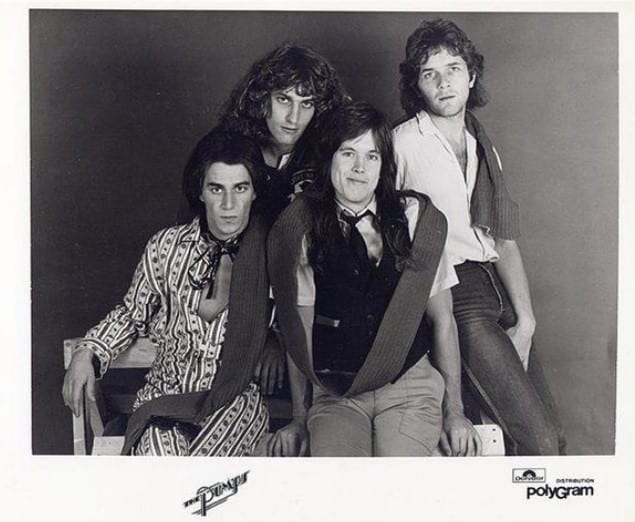
1980 promotional photo, L to R: Lou Petrovich - guitar, Brent Diamond - keyboards, Terry Norman-Taylor - drums/vocals, Chris Burke-Gaffney - bass/vocals
In the mid-1980s, The Pumps evolved into Orphan with two albums and each of those albums spawning two singles “Saved By the Bell”/”Night Parade,” “Miracle”/”Any Time at All,” “Lyin’ to Me”/”Steel & “Iron” and “Open Up the Skies”/”The Way it Should Be.”
The Pumps/Orphan link:
Our musical visit to Canada concludes next week with Celine Dion and composer and pianist Stephan Moccio.










